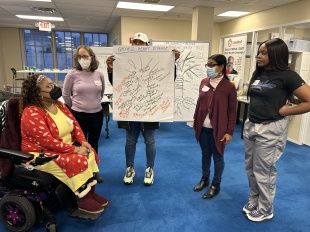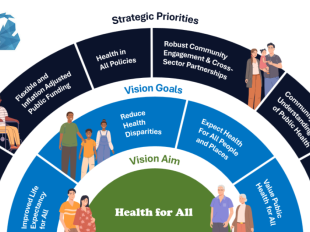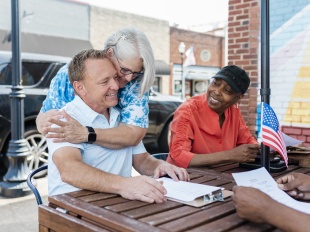Eight Ways to Advance Health Equity
Winning the Culture of Health Prize brings with it the opportunity to join an ever-growing network of communities that learn from one another on how to build healthier, more equitable neighborhoods, towns, cities, counties, and tribal nations. Through this “family,” nine communities, all within a day’s drive of each other in the Northeast, have come together to form their own regional Culture of Health Prize Network.
During the Northeast Forum, this network’s gathering, participants discuss common regional challenges and share solutions that have worked for them. Each year’s meeting focuses on one theme or challenge and this year’s was no exception. At this May’s 2018 Northeast Forum, six of the nine communities gathered to explore how community and economic development can be used to advance health equity. After a day of engaging discussions and collaboration facilitated by 2015 Culture of Health Prize winner Lawrence, Massachusetts, the following takeaways on how communities can advance health equity were shared:
-
Engage with everyone: Engagement is the most essential activity for progress. Community leaders can’t create change without listening to the community and their needs and concerns.
-
Consider the consequences of discriminatory practices and policies: Advancing equity cannot happen without first understanding the impact of discriminatory policies and practices on health and well-being.
-
Understand the impact of policies on underserved populations: To create equitable communities, leaders need to understand how immigrants and people with fewer socioeconomic opportunities have been isolated from opportunities.
-
Use a data-driven approach: From implementing evidence-informed practices to measuring outcomes, data has to be at the heart of community development work.
-
Be aware of systemic barriers: Understand how barriers to things like good jobs, affordable homes, and quality education can hinder economic opportunities, and think creatively about how to bring partners together and use resources to break down these barriers.
-
Work with small businesses: Small businesses are essential to a community’s economic vibrancy and residents’ well-being. Communities need to work with local businesses to create bridges and invite them to be a part of development conversations.
-
Understand the role housing plays in health: Safe, secure homes at affordable prices are a foundation for good health and well-being. To build more equitable communities, leaders need to understand the housing issues residents face, from affordability to accessibility.
-
Build social connections: Building and maintaining relationships with residents takes time - but it is a worthwhile investment. The more leaders communicate with their communities, whether it’s through social media or by ensuring messages are available in multiple languages, the more it builds trust and fosters more resident engagement.
The strategies above sparked discussion at the forum and were developed by Vilma Martinez-Dominguez and Elecia Miller.
These communities are not alone in their efforts to advance health equity. Learn more about how communities across the country are engaging all residents and putting equity at the forefront of their work. And share how your community is building a Culture of Health and advancing equity. Apply for the 2019 Culture of Health Prize today: https://rwjf.org/prize.



